A Noha (Persian: نوحه, Urdu: نوحہ; translit. nūḥa/nawḥa), when interpreted in light of Shia views, is a lament about the tragedy of Hussain ibn Ali in the Battle of Karbala.
Noha has the historical and social milieu of pre-Islamic Arabic and Persian culture. The sub-parts of Marsiya are called Noha and Soaz which means lamentation. It is usually a poem of mourning.
Lamentation has a central part in the literature of the followers and devotees of the Ahl al-Bayt. The tradition of elegizing Hussain and the Karbala tragedy is not limited to Arabic speaking poets, poets from different languages have also contributed a significant poetic literature in their language. In Urdu language, a number of poets like, Mir Anis and Mirza Dabeer have contributed a treasure in Marsiya and its sub branch Noha. In like manner, Kashmiri-speaking Poets have also made significant contributions to produce elegies for Imam Hussain and the Karbala tragic incidents.
The Rich Tradition of Kashmiri Nohas: A Deep Dive into Poetic Lamentations
Introduction
A Noha (Persian: نوحه, Urdu: نوحہ; translit. nūḥa/nawḥa) is a poignant lament that occupies a significant place in the cultural and religious practices of Shia Muslims. Rooted deeply in the tragedy of Hussain ibn Ali and the Battle of Karbala, Nohas serve as a medium for expressing sorrow and reverence for the sacrifices made during this historic event. This tradition, rich in history and emotion, transcends language barriers and is found in various linguistic and cultural milieus, including Kashmiri.
Historical and Social Context
The tradition of Nohas can be traced back to the pre-Islamic Arabic and Persian culture where lamentation poetry held a revered place. Within the broader category of Marsiya, which are elegies dedicated to the tragedy of Karbala, Nohas and Soaz form sub-genres focusing on mourning and sorrow. This literary form evolved to become a central aspect of the devotional practices of the followers of the Ahl al-Bayt, the family of Prophet Muhammad.
The Role of Nohas in Kashmiri Culture
Kashmiri poets have made significant contributions to the tradition of elegizing Imam Hussain and the tragic events of Karbala. These poets, through their heartfelt Nohas, have created a rich tapestry of poetic literature that resonates deeply with the Kashmiri Shia community. The unique cultural and linguistic elements of Kashmir imbue these Nohas with a distinct flavor, making them an integral part of the region’s spiritual and cultural heritage.
Prominent Kashmiri Poets and Their Contributions
Just as Mir Anis and Mirza Dabeer are celebrated for their contributions to Urdu Marsiya and Nohas, several Kashmiri poets have left an indelible mark on this literary form. These poets have masterfully blended the traditional themes of mourning with the linguistic beauty of Kashmiri, creating works that are both emotionally stirring and artistically profound.
- Habibullah Shadipuri: Known for his evocative and deeply moving Nohas, Shadipuri’s work captures the essence of Kashmiri culture while paying homage to the universal themes of sacrifice and sorrow central to the Karbala narrative.
- Ahmadullah Mujahid: Mujahid’s Nohas are renowned for their lyrical beauty and profound emotional depth. His poems often reflect the collective grief of the Kashmiri Shia community, making his work a cornerstone of Kashmiri elegiac poetry.
- Ali Mohammad Shahbaz: Shahbaz’s contributions to Kashmiri Nohas are marked by their intricate poetic structure and rich imagery. His work serves as a bridge between traditional themes and contemporary expressions of mourning.
Themes and Styles in Kashmiri Nohas
Kashmiri Nohas, much like their counterparts in other languages, revolve around themes of martyrdom, sacrifice, and the eternal struggle between good and evil. However, they also incorporate unique elements of Kashmiri culture, such as local metaphors, folklore, and linguistic nuances. This blend of universal and local themes makes Kashmiri Nohas a compelling study for those interested in the intersection of religion, culture, and literature.
Conclusion
The tradition of Kashmiri Nohas stands as a testament to the enduring power of poetry to convey deep emotional and spiritual truths. Through their poignant laments, Kashmiri poets have not only preserved the memory of Hussain ibn Ali and the tragedy of Karbala but have also enriched the cultural and spiritual life of their community. As we continue to explore and appreciate these works, we gain a deeper understanding of the universal themes of love, sacrifice, and resilience that they so beautifully encapsulate.
Further Reading and Exploration
For those interested in delving deeper into the world of Kashmiri Nohas, several anthologies and scholarly works are available that offer a comprehensive look at this rich literary tradition. Additionally, attending local Majlis (gatherings for mourning) can provide a firsthand experience of the emotional and spiritual impact of these powerful laments.

